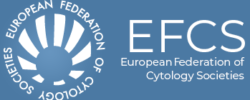EFCS – future aspects
M. Tötsch – candidate for the Secretary General
Dear Friends and Colleagues,
since 2002 I have been elected in the EFCS directory board and I hope that you have appreciated my activity as Treasurer in all these years.
I am a Pathologist and a Cyto-pathologist and as such, I believe that our discipline has a radiant future, but still not the fully recognized position in Medicine that Cytology deserves.
Cytology is changing nowadays and EFCS is electing a new Secretary General.
With this letter I want to present my candidacy to that position and I would like to submit to your attention the first problems that I see in the next future and that the new Secretary General will have to confront.
Which are the obligations to respect and where EFCS should take the responsibility within the next years?
- QUATE
- Education in cytology
- Scientific approaches
- Collaboration with UEMS
QUATE:
While QUATE has become an institution supported to some extent by EFCS, there is actually just an informal collaboration between them. On the other side EFCS will need QUATE in order to recognize levels of competence and to evaluate efficiency of the training in cytology. Thus the logical step will be the integration of QUATE within the Education Task Force to fulfil demands of the UEMS.
Education in cytology:
Actually, EFCS is organizing one tutorial per year with more than 50 participants, most of them are cytotechnicians. This is a non-profit event, dedicated to the training of younger people. In the future we should organize two tutorials per year: one for the younger ones who can pass a QUATE-exam after the week of training, and the second tutorial for (cyto)pathologists, where we will teach the essential issues in diagnosis and how to perform quality control. The workshop is strictly limited to specimen with a cyto/histo-correlation and encompasses lectures in both disciplines.
The Science Task Force
It will have to take care of future developments such as the integration of molecular (cyto)pathology and will need financial support and the establishment of an European Network. These activities will be based on a dynamic website which has already become a very powerful instrument. Actually only few people are interested to join forces, on the other side questions such as the utility of the Bethesda-classification must be addressed by all European institutions to obtain the critical mass.
UEMS:
UEMS has established the criteria for training in pathology, and finally cytopathology is regarded as an integral part of the training (after years of discussion, see website of EFCS). This training charter aims to allow young (cyto)pathologists to be trained and/or work all over the European Union, without limitation by the chosen training facility. In a next step UEMS will most probably mandate EFCS to define training guidelines for the advanced level of competence in Cytopathology and to do manpower planning in cytopathology in each EU country. Both will have to be established and evaluated by EFCS and its suborganisation, QUATE (see above). Although for evident reasons not part of the training charter of pathology, EFCS will have to think about harmonization and recognition of cytotechnologist training for the very same reasons already mentioned for pathologists.
As you see, but much remains to be done and I would appreciate if most of you could share these points of view, add your opinions and work together as we have done in these years, following the path than Philippe Viehl and Alain Verhest have traced
Meet you all in Cavtat

